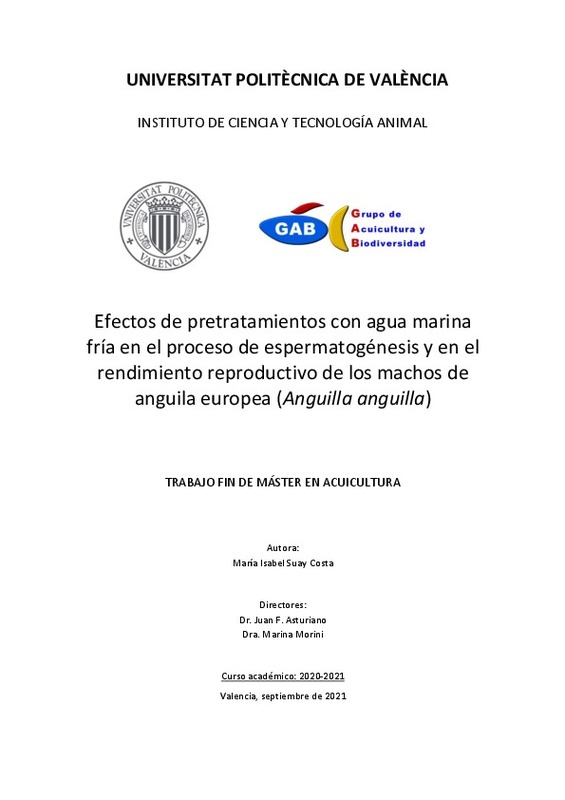|
Resumen:
|
[ES] Estudios recientes han descubierto que el agua marina fría estimula al eje cerebro-hipófisis-gónada e induce un desarrollo sexual temprano en los machos de anguila europea (Anguilla anguilla). Estos resultados sugieren ...[+]
[ES] Estudios recientes han descubierto que el agua marina fría estimula al eje cerebro-hipófisis-gónada e induce un desarrollo sexual temprano en los machos de anguila europea (Anguilla anguilla). Estos resultados sugieren que el agua marina fría podría utilizarse como un tratamiento previo al método hormonal estándar aplicado para inducir la maduración sexual con el fin de obtener una mayor cantidad y calidad de esperma. El objetivo de este trabajo fue evaluar los efectos de pretratamientos con agua marina fría (10°C) de diferente duración (0 o control, 1, 2 y 4 semanas) sobre el proceso de espermatogénesis y rendimiento reproductivo, en un total de 88 machos de anguila; así como su efecto sobre los niveles plasmáticos de esteroides y a nivel celular. Los peces se ubicaron en 8 acuarios con 10 peces cada uno, que se repartieron en un total de 4 pretratamientos (2 acuarios/pretratamiento). Se determinaron los siguientes parámetros biométricos: índice ocular (IO), de la aleta (IA), hepatosomático (IHS) y gonadosomático (IGS). En cuanto a los esteroides, se analizó la concentración en sangre de estradiol (E2), testosterona (T) y 11-ketotestosterona (11KT). A nivel de histología testicular, se determinaron los porcentajes celulares de espermatogonias indiferenciadas (SPGind), espermatogonias tipo A diferenciadas (SPGAdif) y espermatogonias tipo B tempranas (SPGBtemprana). Los machos que recibieron los pretratamientos a 10 °C durante 1, 2 y 4 semanas mostraron un aumento de los parámetros biométricos y de los niveles plasmáticos de andrógenos y E2, con respecto a los del grupo control. Además, los machos mantenidos a 10°C durante 4 semanas mostraron una mayor proporción de SPGAdif en comparación con SPGAind. Estos resultados, por tanto, sugieren que un pretratamiento de agua marina fría promueve una maduración sexual temprana. Sin embargo, la baja calidad del esperma en los grupos pretratados reveló que el pretratamiento a 10°C seguido del tratamiento hormonal tradicional con gonadotropina coriónica humana recombinante (hCGrec) a 20°C afecta de manera negativa a la espermatogénesis. Los machos que fueron sometidos a una temperatura del agua de 10°C durante 1, 2 y 4 semanas tuvieron una respuesta rápida y dependiente de la duración del pretratamiento al tratamiento con hCGrec (en comparación con los machos del grupo control mantenidos a 20 °C). Sin embargo, su periodo de espermiación fue más corto y sus parámetros de movilidad espermática fueron significativamente menores, lo que sugiere un efecto del pretratamiento térmico sobre la regulación de los genes implicados en el proceso de la espermatogénesis, que a su vez conduce a una inhibición de la maduración final del esperma.
[-]
[EN] Recent studies found that cold seawater stimulates the brain-pituitary-gonad axis and induces early sexual development in male European eels (Anguilla anguilla). These results suggest that cold seawater could be used ...[+]
[EN] Recent studies found that cold seawater stimulates the brain-pituitary-gonad axis and induces early sexual development in male European eels (Anguilla anguilla). These results suggest that cold seawater could be used as a pretreatment to the standard hormonal method applied to induce sexual maturation in order to obtain higher sperm quantity and quality. The objective of this work was to evaluate the effects of pretreatments with cold seawater (10°C) of different duration (0 or control, 1, 2 and 4 weeks) on the process of spermatogenesis and reproductive performance, in a total of 88 male eels; as well as their effect on plasma steroid levels and at the cellular level. The fish were organized in 8 aquaria with 10 fish each, which were distributed, in pairs, in a total of 4 pretreatments (2 aquaria/pretreatment). Ocular, fin, hepatosomatic and gonadosomatic indices were determined. As for steroids, blood concentrations of estradiol (E2), testosterone (T) and 11-ketotestosterone (11-KT) were analyzed. At the testicular histology level, cell percentages of undifferentiated spermatogonia (SPGund), differentiated type A spermatogonia (SPGAdiff) and early type B spermatogonia (SPGBearly) were determined. Males treated at 10 °C for 1, 2 and 4 weeks showed an increase in biometric indices and plasma androgen and E2 levels compared to the control group. In addition, males maintained at 10°C for 4 weeks showed a higher proportion of SPGAdiff compared to SPGAund. These results, therefore, suggest that a cold seawater pretreatment promotes early sexual maturation. However, low sperm quality in the pretreated groups revealed that pretreatment at 10°C followed by traditional hormonal treatment with recombinant human chorionic gonadotropin (hCGrec) at 20°C negatively affects spermatogenesis. Males that were subjected to a water temperature of 10°C for 1, 2 and 4 weeks had a rapid and time-dependent response to hCGrec treatment (compared to control group males maintained at 20°C). However, their spermiation period was shorter and their sperm motility parameters were significantly lower, suggesting an effect of thermic pretreatment on the regulation of genes involved in the spermatogenesis process, which in turn leads to a final inhibition of sperm maturation.
[-]
|







